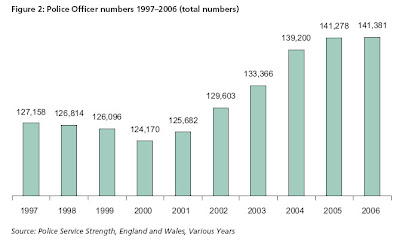We taxpayers imagined they were going to spend it on more cops for our lawless streets. Have they? Er, no. Here are the numbers:

As we can see, since 1997, the number of police officers has increased by just 11% - only one-quarter of the increase in money. The man from Association of Chief Police Officers - the ironically named Dr Brain - explained to the Committee:
"The investment has not been blindly spent on additional officers but has been wisely invested across a range of initiatives so as to maximise the return in relation to service performance."
Oh yeah? Like what?
Er... Airwave.
Airwave? That's that wildly overpriced police mobile phone system (see this blog), isn't it? Yup, that's the one.

But although 20% of their time is spent on paperwork, the government actually counts most of that as "frontline policing". As the Committee drily observes, that "skews the statistics and gives an exaggerated impression of the Government’s success in returning police officers to street duties."
You might want to remember that next time some minister brags about how much more police time is being spent on "the frontline". It probably just means even more paperwork is being processed.
Then there's the whole issue of the widely touted fall in crime. One big problem there (as we blogged here) is that although some crimes have fallen, the serious crimes we really worry about haven't. Moreover, much of the overall fall has had nothing to do with the police. As the Committee notes:
"In the case of both vehicle crime and burglary, improvements in security—far more than any government action—have probably been a significant contributor to overall falls...
Excluding successes on burglary and vehicle theft, there has been a more mixed picture in tackling overall crime, particularly given the increase in resources available to the police. For example, between 2002–03 and 2005–06 violent crime as measured by the police recorded crime statistics showed a 21% increase..."
The Committee also highlights the inconvenient (for the police) fact that the big decline in British Crime Survey crime came before the surge in police budgets:
"The significant drop in overall BCS-measured crime occurred between 1995 and 2001, with crime levels remaining roughly stable, or only slightly decreasing, between 2001 and 2006... It is striking that much of the decrease in overall crime rates over the past ten years occurred before the major increase in investment." (para 20)
And then there are those wretched tractor production targets. The police boast that production has never been higher. They told the Committee:
"The numbers of offences brought to justice (OBTJ), the key government crime reduction target, “have increased by 20% (from 1998–99 to 2005–06)” and that there has been “an increase of 6% in the number of OBTJ per police officer over the same period”.
The trouble is that much of this apparent achievement relates to petty offences. The Committee noted:
"The Government’s key crime reduction target, ‘offences brought to justice’, is not a good indicator of success in relation to the types of crime which the public fear most.
Performance against the target improved by 20% between 1998–99 and 2005–06. However, in the twelve months to March 2006 a large proportion (38%) of offences brought to justice were made up of petty offences in the form of warnings, Cautions and Penalty Notices for Disorder, and only 53% comprised convictions. There is a strong case for excluding summary justice measures from this target." (para 30)
So that's yet another useless- and probably counterproductive- top-down target.
The blunt truth is that neither the government nor the police have any idea whether they're delivering value. And frankly, they don't really care. As the Committee observes:
"200 police officers spent the day watching all 80,000 vehicles crossing the two Severn bridges, using number plate recognition technology. They were supported by immigration officers, vehicle inspectors, etc, etc - at least 50 supporters.
But they only stopped about 150 vehicles. So the tally is 3/4 of a vehicle stop per police officer. My guess is that it cost over £1,000 per stop."
And the final result? Just 19 arrests, for "breach of bail, theft of motor vehicle, possession of class A drugs, being in possession of an offensive weapon and fraud".
200 officers from four forces. A whole day. Just 19 ragbag arrests.
True, it got on BBC TV Points West, which may well have been the object of the exercise. But it's not what we pay our taxes for.